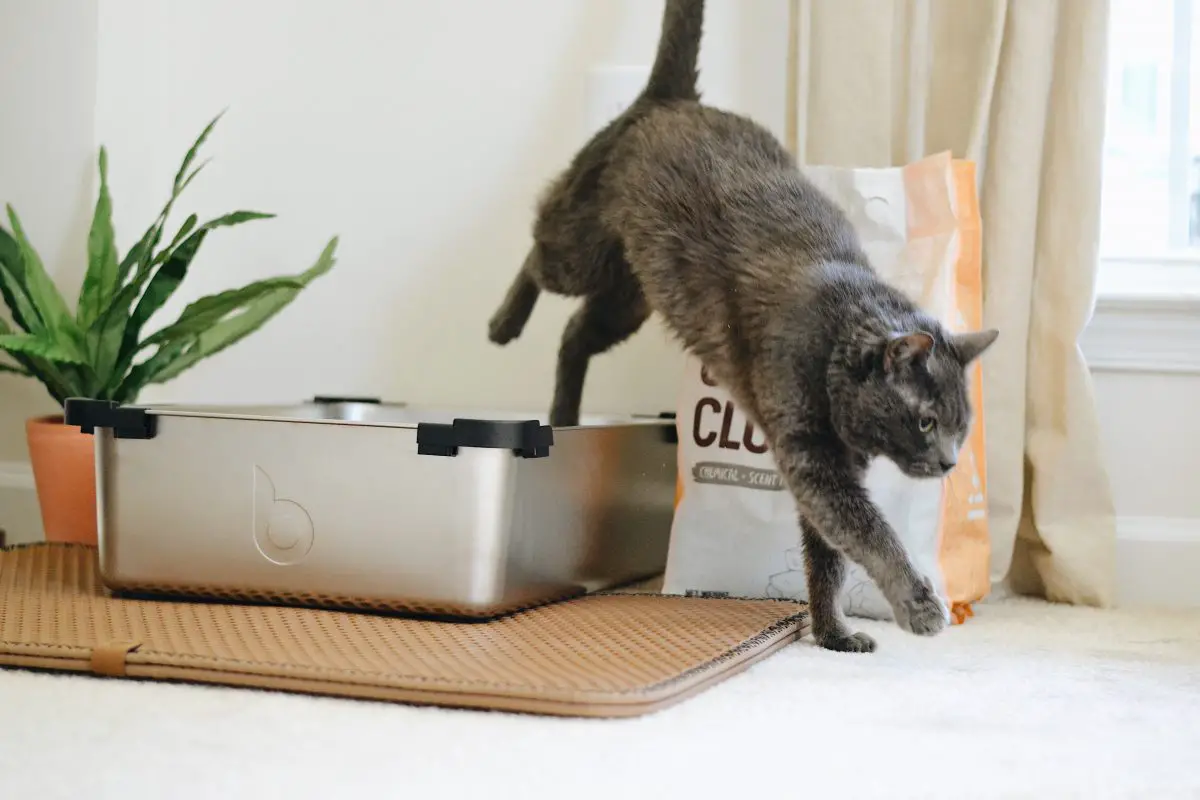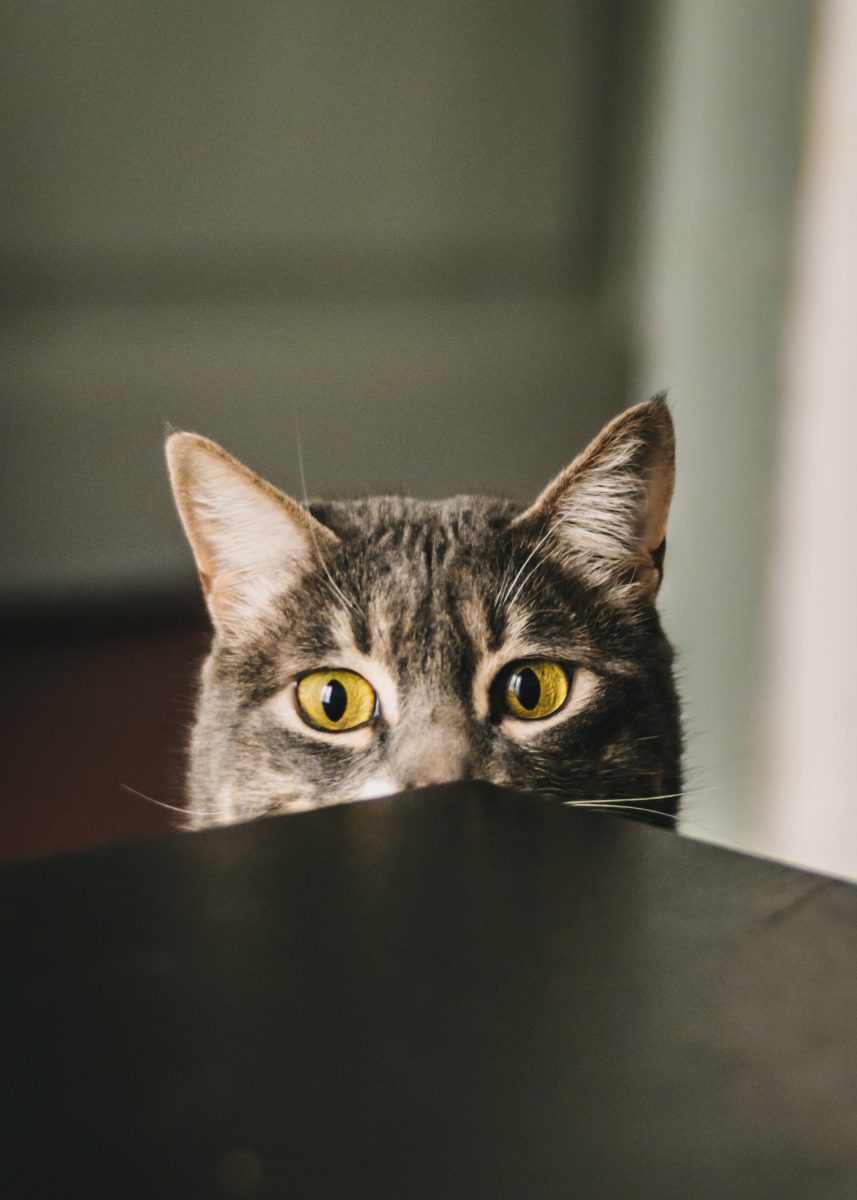Come proprietario di un gatto, sai che i gatti sono degli addetti alle pulizie meticolosi che amano la pulizia. Allora perché il mio gatto fa pipì ovunque all'improvviso, chiedi? I problemi urinari, sia medici che comportamentali, sono molto comuni tra i gatti. Sfortunatamente, anche se la maggior parte dei problemi può essere risolta, la maggior parte delle persone finisce per sistemare i propri gatti prima di provarci. Se sei qui significa che stai cercando una risposta, quindi non farti aspettare!
Se il tuo gatto o gattino sta facendo pipì fuori dalla lettiera, c'è una ragione per questo.

Indice
- Perché il mio gatto fa pipì ovunque all'improvviso?
- Ragioni comportamentali per cui un gatto fa pipì ovunque
- Ragioni mediche per i gatti che fanno pipì fuori dalla lettiera
- Come faccio a convincere il mio gatto a smettere di fare pipì ovunque?
- Perché il mio gatto fa pipì ovunque all'improvviso: niente più pozzanghere!
- FAQ
Perché il mio gatto fa pipì ovunque all'improvviso?
Anche se trovare o annusare pipì di gatto ovunque in casa potrebbe sembrare un atto di guerra. Tuttavia, devi ricordare che le azioni del tuo gatto non sono qualcosa che viene fatto intenzionalmente o per aggressività. Punire il tuo gatto per aver fatto pipì fuori dalla lettiera non risolverà alcun problema. In effetti, tali misure spesso peggiorano le cose. I gatti non rispondono al rinforzo negativo e punizioni.
Se il tuo gatto fa pipì ovunque all'improvviso ma ha già usato la lettiera, spesso si tratta di una condizione medica o di un problema comportamentale. Esploriamo entrambe le possibilità, in modo da poter capire la migliore linea d'azione.
Ragioni comportamentali per cui un gatto fa pipì ovunque
I gatti agiranno spesso a sproposito quando qualcosa non va in casa. Essendo che i gatti sono creature abitudinarie, una modifica alla routine quotidiana può cambiare notevolmente il loro comportamento.
Alcuni motivi comportamentali che portano un gatto o un gattino a fare pipì fuori dalla lettiera includono:
- Non mi piace la lettiera.
- Cassetta sporca
- Cambiamenti e interruzioni improvvisi della vita
- Chirurgia (come il recupero dall'essere privati degli artigli)
- Non sterilizzato o castrato
- Preferenza del tipo di lettiera
- Gelosia
- Ansia
Ecco qualche dettaglio in più:
Cambiamenti e interruzioni in casa
Prenditi un momento per considerare eventuali eventi recenti. Hai ristrutturato la tua casa o avviato un grande progetto? Hai ospitato più feste o hai fatto visita a membri della famiglia per alcuni giorni? Sebbene possano essere eccitanti e gioiosi per te, il tuo gatto non prova altro che sconvolgimento.
Anche quando la lettiera viene spostata è il caos più totale. Il tuo gatto potrebbe sentirsi stressato e voler fare pipì dove fa di solito. Se qualcosa cambia o se è troppo ansioso, potrebbe portare a fare pipì ovunque tranne che nella lettiera.
Cambiamenti nel tipo di lettiera o nella scatola
Hai recentemente scambiato un diverso tipo di lettiera? Hai acquistato una nuova lettiera? Il tuo gatto è troppo grande per la scatola? Ogni volta che apporti un cambiamento che non si adatta alle preferenze del tuo gatto, c'è il rischio che trovi un posto più comodo per fare i suoi bisogni.
È importante trovare uno stile di scatola adatto al tuo gatto. I gatti grandi o a pelo lungo potrebbero non amare una lettiera coperta e chiusa, perché dà una sensazione claustrofobica. Alcuni gatti potrebbero avere difficoltà con i granuli più grandi e necessitano di una lettiera più morbida.
Cassetta dei rifiuti sporca
I gatti non vogliono andare in bagno in un posto disgustoso. A volte, se la scatola non viene pulita per un po', non la useranno. Assicurati di pulire regolarmente la scatola, soprattutto se più gatti la utilizzano. Non dimenticare di versare della lettiera fresca di tanto in tanto e di pulire la scatola con un disinfettante.
Gelosia
È interessante notare che i gatti possono provare una vasta gamma di emozioni. Ciò significa che potrebbero usare un comportamento scorretto per attirare la tua attenzione. La gelosia si verifica ogni volta che porti a casa un nuovo animale domestico o bambino, poiché la tua attenzione si sposta dal tuo gatto ad altre cose.
Dare un po' di amore al tuo gatto può risolvere i suoi problemi di pipì, ma un veterinario potrebbe essere in grado di prescrivere farmaci se si tratta di gelosia e ansia combinate.
Stress e ansia
Nonostante sembrino calmi e spensierati nella maggior parte dei giorni, i gatti possono anche essere creature estremamente ansiose. Un gatto ansioso è anche uno che agisce spruzzando il proprio territorio e facendo pipì per casa. Potresti anche notare altri sintomi di stress nei gatti, come:
- Spargimento eccessivo
- Cambiamenti di appetito
- Diarrea
- Vomito
- Toelettatura ossessiva fino a macchie grezze o calve
- Vocalizzazioni aumentate
- Aggressione
- Nascondersi o cercare la solitudine quando di solito è amichevole
- Corpo teso e pupille dilatate
Dovresti anche guardare il segni di coda di gatto che il tuo amico felino trasmette sempre. Una coda bassa o nascosta è spesso un segno di ansia o paura.
Sospetti che il problema della lettiera sia dovuto allo stress o all'ansia? È meglio parlare con un veterinario. Potrebbero prescrivere alcuni farmaci calmanti. Altri metodi includono diffusori e spray di feromoni.
Non sterilizzato o castrato
Perché la mia gatta fa pipì ovunque all'improvviso, ti chiedi? Ebbene, è sterilizzata? I gatti possono essere territoriali, soprattutto quando sono soli in casa. Quando presenti un nuovo gatto o gattino, stai sconvolgendo il territorio dell'altro gatto; questo li sconvolgerà e potrebbero iniziare a spruzzare le cose che considerano loro. Sebbene ciò possa verificarsi anche dopo che il gatto è stato castrato o sterilizzato, è più comune quando il gatto non è stato modificato.
Questo video fornisce alcuni ottimi suggerimenti per affrontare i gatti irroranti:
Tieni presente che spruzzare e urinare sono due cose diverse. Se il tuo gatto sta spruzzando, avrà un odore peggiore. Di solito, il modo migliore per impedire al tuo gatto di farlo marcatura delle urine in giro per casa è farli sterilizzare o castrare.
Ragioni mediche per i gatti che fanno pipì fuori dalla lettiera
Molti proprietari di gatti confondono la pipì del gatto ovunque in casa come un problema comportamentale invece che come una condizione medica. Per questo motivo molti gatti non vengono curati per molto tempo. Ti consigliamo di portare il tuo amico felino dal veterinario non appena inizia a fare pipì fuori dalla lettiera per escludere problemi di salute. Altrimenti, i problemi potrebbero peggiorare e causare molto dolore e disagio al tuo compagno.
Ecco alcuni problemi medici che fanno fare pipì ai gatti fuori dalla lettiera:
- Diabete
- Pietre vescicali
- Cristalli di urina
- Infezione delle vie urinarie feline
- Ipertiroidismo
- Cistite interstiziale felina
Prenditi un momento per conoscere queste condizioni. Potresti essere in grado di identificare il problema e portare il tuo gatto dal veterinario più velocemente.
Diabete
Quando si tratta di diabete nei gatti e le persone, uno dei sintomi condivisi è la minzione frequente. Fortunatamente, il diabete è gestibile nei gatti. Una volta tenuto sotto controllo il diabete del tuo gatto, il problema della pipì dovrebbe essere risolto.
Pietre vescicali
Altre condizioni mediche e una dieta povera possono portare a calcoli alla vescica nei gatti. Potresti sospettare che il tuo gatto abbia calcoli alla vescica quando non vuole essere toccato e sembra essere sempre a disagio. Possono anche avere sangue nelle urine, infezioni del tratto urinario cronico, leccarsi incessantemente i genitali e urinare frequentemente (spesso fuori dalla lettiera).
Cristalli di urina
Conosciuto anche come cristalluria, questi piccoli cristalli si formano nelle urine di cani e gatti. Sono composti da minerali, come fosfato, magnesio e anche un po' di ammonio. Passare i cristalli può essere doloroso per il tuo gatto. I gatti maschi sono più inclini a sviluppare cristalli, poiché la loro uretra è più stretta. Obesità, infezioni delle vie urinarie, stress e disidratazione possono causare la formazione di cristalli di urina.
C'è qualche disinformazione su Internet che i calcoli vescicali e i cristalli urinari sono gli stessi, ma non lo sono.
Infezione delle vie urinarie feline (UTI)
Questo non è comune, ma può succedere se i batteri (come quelli che si formano in una lettiera sporca) si fanno strada nell'uretra o nella vescica. I gatti con diabete e le femmine sono più a rischio. Potresti notare sangue nelle urine o il tuo gatto che si sforza persino di fare pipì. Le infezioni delle vie urinarie feline devono essere trattate immediatamente.
Ipertiroidismo
Quando la tiroide del tuo gatto non funziona in modo ottimale, ne derivano altri problemi di salute. Ad esempio, il tuo gatto avrà sempre sete. Dato che bevono molto, fanno pipì frequentemente e, a volte, non riescono ad arrivare alla cassetta.
Cistite interstiziale felina (FIC)
Un disturbo neurologico, la FIC infiamma la vescica e causa problemi con la funzione della vescica. Segni di cistite interstiziale felina includono sforzarsi per fare pipì, sangue nelle urine, ululati durante la pipì, incidenti in casa e minzione frequente.

Come faccio a convincere il mio gatto a smettere di fare pipì ovunque?
Potrebbe essere strano sentire che il tuo gatto semplicemente non ama la lettiera e ha deciso di eliminarla altrove, ma nella maggior parte dei casi questa è la verità. Se all'improvviso il tuo gatto fa pipì ovunque e non ci sono problemi di salute, allora devi cambiare la lettiera. Ecco alcuni suggerimenti per convincere il tuo gatto a smettere di fare pipì in casa:
- Rendi la lettiera il più desiderabile possibile. Mantieni la scatola pulita.
- Prendi una lettiera più grande e assicurati che ci siano abbastanza scatole per i gatti in casa. Una regola pratica comune è una scatola per gatto e una in più. Quindi, se hai tre gatti, dovresti avere 3-4 lettiere in giro per casa.
- Assicurati che ogni piano della tua casa abbia una lettiera. Questo è particolarmente importante per i gatti più anziani che potrebbero avere la vescica indebolita.
- Metti le lettiere in zone tranquille della casa. Le scatole dovrebbero essere tenute separate da dove i gatti mangiano e bevono, se possibile.
- Evita i fattori di stress quando possibile. Rendi la tua casa un luogo felice in cui vivere ed esplorare il tuo gatto. Ciò ridurrà il loro stress e ansia.
- Scegli una lettiera che piaccia ai tuoi gatti. Se hanno difficoltà con i granuli di argilla, scegli qualcosa di più morbido. Ci sono molti tipi di lettiera disponibili in questi giorni, quindi hai delle opzioni.
- Usa detergenti enzimatici per rimuovere l'odore di urina da dove il tuo gatto ha fatto la pipì. Altrimenti, potrebbero continuare a fare pipì in questi luoghi, anche se correggi tutto il resto.
Perché il mio gatto fa pipì ovunque all'improvviso: niente più pozzanghere!
All'inizio di questo articolo ti stavi grattando la testa chiedendoti: "Perché all'improvviso il mio gatto fa pipì ovunque?" Spero che tu abbia una risposta ora. Il comportamento del gatto non è facile da decodificare, quindi potrebbe essere necessario visitare il veterinario per escludere eventuali problemi medici. Ricorda, potrebbe essere necessario del tempo per correggere le abitudini scorrette del tuo gatto; ma se sei paziente e dai al tuo amico peloso un po' di tempo per adattarsi, dovrebbe presto tornare a fare pipì nella lettiera come al solito.
FAQ
Un gatto che inizia improvvisamente a urinare in casa potrebbe manifestare questo comportamento per diversi motivi. I problemi medici sarebbero la ragione principale, come le infezioni del tratto urinario o l’invecchiamento. Fattori di stress come il trasloco in una nuova casa, i cambiamenti nella routine, l’introduzione di un nuovo animale domestico o anche i cambiamenti all’interno della famiglia possono portare all’ansia, spingendo a urinare in modo inappropriato. Anche problemi relativi alla lettiera o alla marcatura territoriale possono essere motivi per fare pipì inappropriata.
Gestisci correttamente la lettiera del tuo gatto. Identifica e affronta eventuali fattori di stress nell'ambiente del tuo gatto. Pulisci tutte le aree in cui il tuo gatto ha urinato fuori dalla scatola con un detergente a base di enzimi per eliminare l'odore. Se hai più gatti, assicurati che ogni gatto abbia il proprio spazio, cibo, acqua e lettiera.







